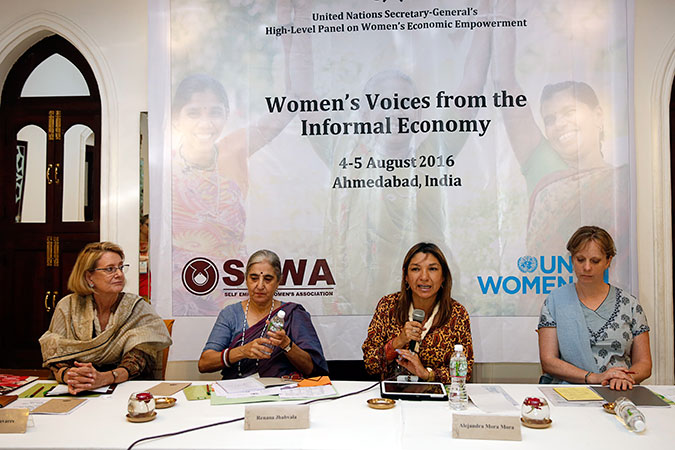UN High-Level Panel on Women’s Economic Empowerment hears from women in the informal economy in India
Date:

(Left-Right): Dr. Rebecca Reichmann Tavares, Representative, UN Women India; Renana Jhabvala, National Coordinator, SEWA; Alejandra Mora Mora, Minister for Status of Women, Costa Rica; and Gwen Hines, International Director, UK Department for International Development (DFID) address the media at a two-day consultation of the High-Level Panel on Women’s Economic Empowerment, in Ahmedabad, India. Panel members heard from women informal workers and entrepreneurs—such as street vendors, garment workers, and waste pickers, among others—about the challenges they face and the solutions they have implemented. The Panel will mobilize global action to strengthen women’s participation in economic activity and will submit a global report providing recommendations for actions that can be taken by governments, the private sector, civil society and the UN system to achieve the Sustainable Development Goals.Photo: UN Women/Ishan Tankha
UN Women and the Self Employed Women’s Association (SEWA) jointly hosted a global consultation on ‘Women’s Voices from the Informal Economy’ on August 3rd at Ahmedabad, India, as part of the UN Secretary-General’s High-Level Panel (HLP) on Women’s Economic Empowerment.
The event brought together eminent experts on economic empowerment and women informal workers who have organized to form producer groups and collectively advocated for legal reform, social protection and financial inclusion. The participants also included Alejandra Mora Mora, Minister for the Status of Women, Costa Rica; Gwen Hines, International Director, UK Department for International Development (DfID); Meg Jones, Chief of Women’s Economic Empowerment, UN Women; Rebecca Reichmann Tavares, Representative, UN Women India; and Panudda Bonapala, Country Director, International Labour Organisation (ILO).
The UN High-Level Panel was announced in January 2016 to mobilize global action to strengthen women’s participation in economic activity. Chaired by the President of Costa Rica and the CEO of IKEA, Switzerland, the Panel includes the leaders of the International Monetary Fund, World Bank Group, UN Women and a range of gender equality actors, economics experts, academics, trade union leaders, business and government representatives from all regions.
The consultation in Ahmedabad provided an opportunity for Panel members to learn first-hand from women workers about the issues they face and the solutions they have implemented.
“The SEWA-UN Women consultation has been designed to provide deep insight into the lives of women at the grassroots,” said Renana Jhabvala, National Coordinator of SEWA and member of the UNHLP. “The core aim of this consultation is to hear the voices of the invisible—what is their perspective on economic empowerment? Their inputs will go a long way in shaping policies that are meant to usher them into the mainstream,” she added.
“Despite the legal guarantees for employment, women’s participation in the economy in India continues to remain low—and is in fact declining—due to structural barriers that prevent women from entering and growing in the workforce on equal terms,” said Dr. Rebecca Reichmann Tavares, Representative, UN Women India. “UN Women works to create an enabling environment to strengthen informal workers’ organizations through dialogue and advocacy. We believe in the power of collective action as the most effective means of moving forward, and we are hopeful that the High-Level Panel’s work will help strengthen our work locally in India and use success stories from the sub-continent as good practice examples that can be shared globally.”
Alejandra Mora Mora, Minister for the Status of Women, Costa Rica, spoke about lessons learnt during the interactions with women informal workers. “The HLP’s report will have the voices of women in it. During the field visits, we observed the pride that the women felt in the work they were doing. We also saw how women support each other and the joy they felt at each other’s successes—this has implications for families as well as communities. Women make significant contributions to the global economy and this has to be recognized and valued.”
“We need a report that speaks to finance ministers, to CEOs and to people who can create more and better jobs,” said Gwen Hines, International Director DfID. “We need to show businesses that diversity is good for them. We need a report that highlights the impact of empowering women on education, health and other development indicators.”
The next High-Level Panel consultation will be hosted by UN Women, in collaboration with the Office of the Vice Chancellor of University of Witwatersrand, on 11 August in Johannesburg, South Africa, under the theme, 'Making Economies Work for Women in the South: What Will it Take?'
For more information on the UN Secretary- General’s High-Level Panel, visit this website.
High resolution images and social media package are available here.